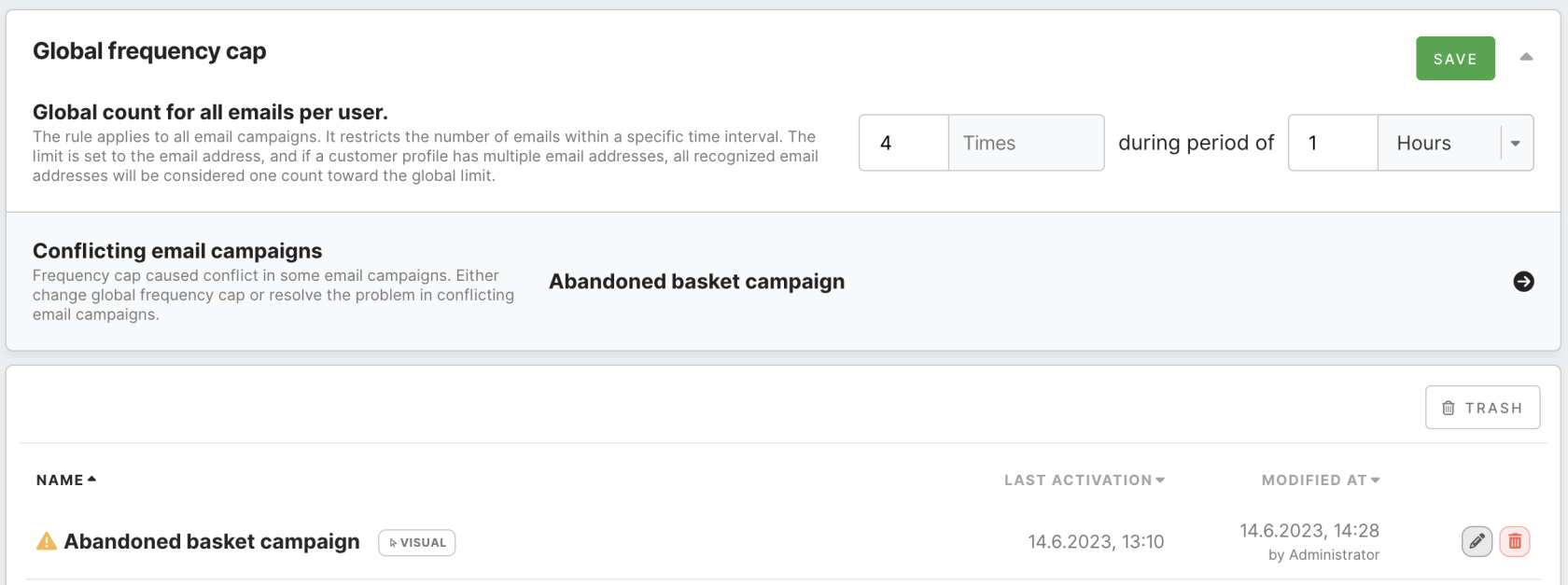Emails: how to set frequencies
The frequency capping allows you to establish rules for all sent emails, with the flexibility to edit them as needed. You can adjust frequencies on two levels: the Global and local frequency caps.
Warning: The frequency capping feature limits the number of emails sent to users based on their email address and not per profile ID. If a user has multiple email addresses associated with their profile, all recognized email addresses will receive the emails, subject to the frequency capping restrictions.
Global frequency cap |
The global frequency cap is a useful tool for managing multiple emails sent. It is placed in the list of emails on the top. Use the collapse button to expand settings.
Specify the desired frequency of email delivery in terms of days or hours. The default limit is set to 1 email per 1 day. Save to apply changes.
Global frequency cap rules overwrite local frequency caps for each email campaign.
When saving the global frequency cap, a modal window may appear, showing a list of email campaigns with stricter limits in their local frequency caps. You may choose to adjust the limits for each campaign individually or save without making changes. In the latter case, the campaigns with conflicting limits will be listed with a warning icon. The presence of the warning icon does not affect the campaign's activation. The icon serves as a notification to the user, indicating that the campaign will continue to run based on the stricter limits specified in its local frequency cap. |
Local frequency cap |
The local frequency caps are placed in every email campaign under the Activation tab. Specify the desired frequency of email delivery in terms of days or hours. The default limit is the same as the global limit. Save to apply changes.
If you use stricter limits in the local frequency cap than in the global, the campaign will be displayed in the list with a warning icon next to its name. The icon serves as a notification to the user, indicating that the campaign will continue to run based on the stricter limits specified in its local frequency cap.
To bypass the frequency limit for a specific email, select the "Ignore global frequency cap" checkbox. The campaign will be displayed in the list with a lightning icon next to its name.
Remember: If an Email has been set to ignore the global frequency cap, it will display regardless of the global limit and will not contribute to the global count of impressions. |
Global frequency cap
The global frequency cap is a useful tool for managing multiple emails sent. It is placed in the list of emails on the top. Use the collapse button to expand settings.
Specify the desired frequency of email delivery in terms of days or hours. The default limit is set to 1 email per 1 day. Save to apply changes.
Global frequency cap rules overwrite local frequency caps for each email campaign.
When saving the global frequency cap, a modal window may appear, showing a list of email campaigns with stricter limits in their local frequency caps. You may choose to adjust the limits for each campaign individually or save without making changes. In the latter case, the campaigns with conflicting limits will be listed with a warning icon. The presence of the warning icon does not affect the campaign's activation. The icon serves as a notification to the user, indicating that the campaign will continue to run based on the stricter limits specified in its local frequency cap.
Local frequency cap
The local frequency caps are placed in every email campaign under the Activation tab.
Specify the desired frequency of email delivery in terms of days or hours. The default limit is the same as the global limit. Save to apply changes.
If you use stricter limits in the local frequency cap than in the global, the campaign will be displayed in the list with a warning icon next to its name.
To bypass the frequency limit for a specific email, select the "Ignore global frequency cap" checkbox. The campaign will be displayed in the list with a lightning icon next to its name.
Remember: If an Email has been set to ignore the global frequency cap, it will display regardless of the global limit and will not contribute to the global count of impressions.



